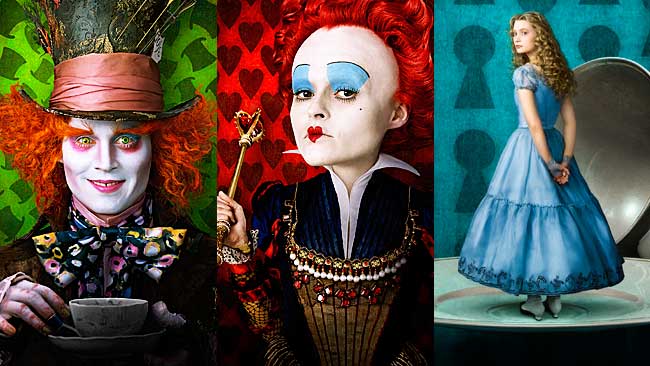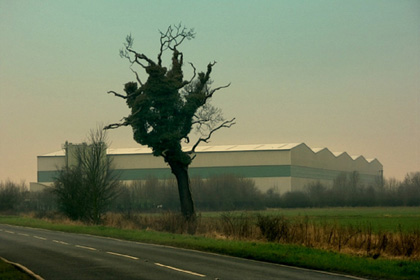March 24, 2010
Free education
Nina and I discussing free education (me in dialogue with Mike Watson) over at Indieoma.
Infantilizing children

Burton's Alice In Wonderland is such a travesty that it makes the 1951 Disney version seems like a masterpiece by comparision. Perhaps that's because animation seems ideally suited to rendering the onto/logical leaps in Carroll's psychedelic fiction, whereas CGI puts all its energy into being "realistic", without creating any sense of reality at all. But the most serious problem in Burton's version is Linda Woolverton's screenplay. As many reviewers have noted, Woolverton effectively grafts elements of Oz and Narnia onto Wonderland. It was perhaps the Narnian influence - via Harry Potter - which induced Woolverton into introducing the messianism which so fatally betrays the spirit of Carroll's fiction. (The same kind of cheap messianism also corrupted Russell T Davies Dr Who.) In Woolverton's Wonderland, Alice becomes a Prophesied Champion who will liberate the oppressed people from the tyranny of the Red Queen by defeating the Jabberwocky. Nothing could strike a more false note than the imposition of this facile binary onto Carroll's beyond good and evil schizofiction. Throughout the film, questions are raised as to whether this is the "proper" Alice, but the viewers are never left in any doubt that this is the True Alice; she must only have to learn to recognise herself and her Destiny. Yes, this is a film aimed at children - but must children be infantilized to this degree? All of the troubling problems of identity and reference so crucial to the original novels are ignored. At some point, it'll be worth thinking through why this messianism plays such a key role in neoliberal culture, but, for the moment, it will suffice to identify why its presence is toxic to Alice In Wonderland. In the Alice books, there is the feeling that Wonderland is Alice's world alone, yet she has no place in it. She is always late, in the way, misunderstanding what ought to be obvious ... In this way, Carroll is the precursor of Kafka, and ultimately Alice's Adventures In Wonderland has far more in common with The Trial and The Castle than with The Lion, The Witch and The Wardrobe or The Wizard of Oz. K's blundering attempts to penetrate the court and the castle, his exasperation and impotent acts of rebellion, echo Alice's frustrations in Wonderland. The adult world as seen by children is, precisely, a Nonsense world, incomprehensibly inconsistent, arbitrary and authoritarian, full of bizarre rituals. Alice's friendlessness is central to this: but in Burton's version the caterpillar, the Mad Hatter and the Cheshire Cat are no longer autists but companions helping Alice achieve her Destiny (Depp's "Mad" Hatter is the film's lowpoint - the Depp/ Burton relationship has long been one of mutual indulgence, and so it proves again). It's notable also that Burton's version downplays the linguistic anomalies which were so central to Carroll (they are represented only by the eccentric speech of Tweedledum and Tweedledee). Yet Caroll's Wonderland was a world of words, constructed from the excrescences of the Symbolic (doesn't this also account for some of the power of Carroll's tales - they view the Symbolic from the perspective of one not fully integrated into it?)
I'll confess that I've actually not seen what is reputedly one of the best versions of Carroll, Jonathan Miller's 1965 film for the BBC. Watching the tea party in Miller's version, you can't help but reflect on the similarities to the entropy of Miss Havisham gothic wedding breakfast. Pip's (non-)relationship with Havisham and the other grotesques of the adult world anticipates Alice. Indeed, much of Alice's Adventures In Wonderland recalls the opening sections of Great Expectations, in particular, in which, remember, the young Pip is menaced by cows who seem to talk. Note the longeurs and the catatonia in Miller's rendering of the tea party (this and Ravi Shankar's music put me in mind not only of "Tomorrow Never Knows" but also "I'm Only Sleeping"...)
March 17, 2010
March 10, 2010
Itchy Chin Club discussion of Capitalist Realism
There will be a discussion of Capitalist Realism at the Itchy Chin Club (an "art, culture, politics, history and philosophy book group based in central London") on 31st March. Details here. All welcome.
Hauntology at Cafe Oto
The Wire Salon: Revenant Forms: The Meaning of Hauntology
A new series of monthly salon-type events, hosted by The Wire magazine at Cafe Oto in East London, and dedicated to the fine art and practice of thinking and talking about music. The evenings, which will take place on the first Thursday of each month, will consist of readings, discussions, panel debates, film screenings, DJ sets and even the occasional live performance.
For the first event in the series, Revenant Forms: The Meaning of Hauntology, Mark Fisher (K-Punk) and Adam Harper (Rogue's Foam) will head a panel debating the essence of the spectral, uncanny qualities of much contemporary audio, from dubstep to hypnagogic pop and beyond. The night will also include screenings of a number of short films by Julian House (Ghost Box, The Focus Group), which feature soundtracks by Broadcast, Belbury Poly and others; a live set by Moon Wiring Club; and eldritch vinyl interludes courtesy of Mordant Music.
Kafka 2010
There's been a room change for my talk tomorrow at King's .... it will now be in K.3.11, Strand campus, time the same (6 p.m.)
March 08, 2010
Content

Back soon, but in the meantime, be sure to check out Chris Petit's remarkable film, Content, on More4 tomorrow night. Here's my take on the film....
- One of the most gratifying aspects of Content ... is that by contrast with so many contemporary television documentaries, which neurotically hector the audience by incessantly reiterating their core thesis, Petit trusts in the intelligence and speculative power of the viewer. Where so much television now involves a mutual redundancy of image and voice – the image is slaved into illustrating the text; the voice merely glosses the image – Content is in large part about the spaces between image and text, what is unsaid in (and about) the images.